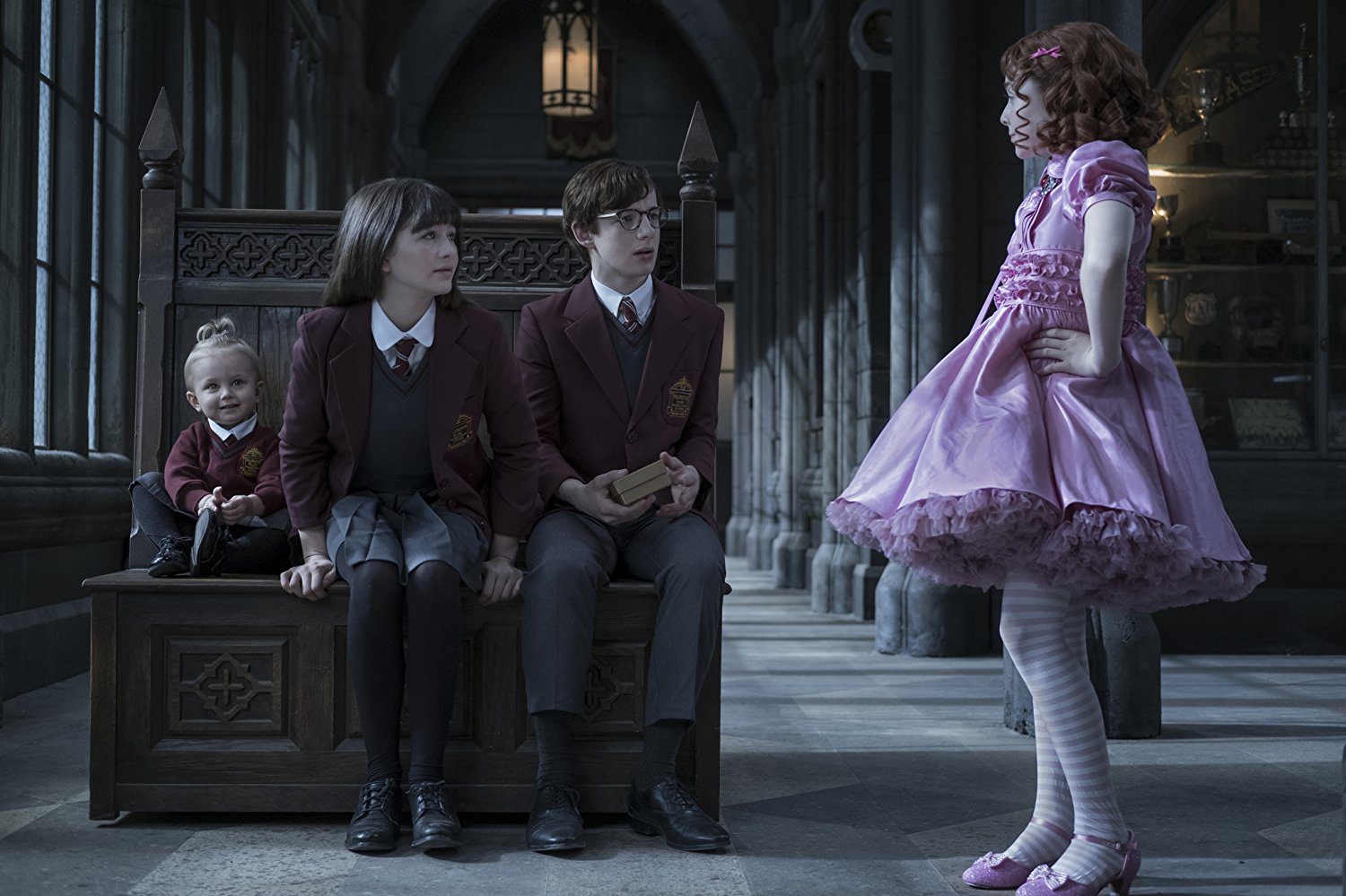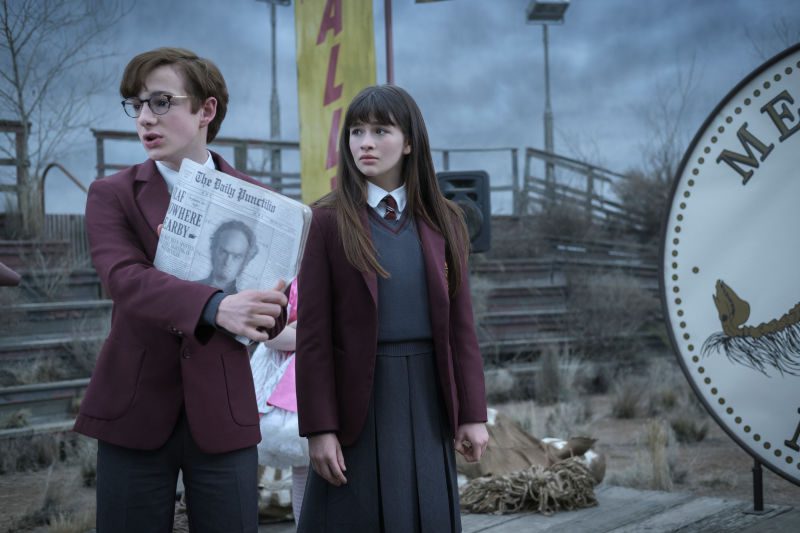In “The Austere Academy: Part Two,” Count Olaf (disguised as Coach Genghis) has the Baudelaire siblings – even Sunny – run laps. Over and over, all night, in an attempt to exhaust them. He has them carry a can of luminous paint, and as they run they create a giant, bright circle. This is a regrettable metaphor for the episode, which sputters until a pleasingly tantalizing ending. A Series of Unfortunate Events is literally running in circles with this installment; it’s not a disaster, but it doesn’t bring much to the table that’s new (with one promising exception).
Which is a shame, because “Part Two” gets off to a solid start, with Jacques Snicket coming to rescue Larry from the walk-in freezer (turns out Jack London stories are actually terrible antidotes to frostbite). Nathan Fillion is perfectly cast as Jacques, not only because of his resemblance to Patrick Warburton (Jacques and Lemony are brothers), but because of Fillion’s persona as an actor. It’s kind of amazing he hasn’t been in this show yet, so adept is he at weaving himself into the show’s sense of gallows humor. Fillion can play capable, and he can play buffoonish; the role of Jacques requires both, and he accomplishes the balance with aplomb. Few other actors could tell a child “It takes one to know one” and make the delivery as smooth as Fillion does here. He’s still alive by the end of the episode, which is a rarity that we’ll get to, so here’s to hoping we see more of Jacques very soon.
Elsewhere, “Part Two” just kind of runs in laps. Pains are taken to show just how monotonous and opaque Olaf’s plan is, but the by product of that is that we don’t get a good sense of what’s at stake. The Baudelaire fortune, yes, but Olaf’s scheme is so circuitous that even now I’m not sure I have a good grasp on it. Unfortunate Events feints at some kind of satire, as the Baudelaires have to run all night and attend classes in the morning, and owe Nero bags of candy for every one of his nightly recitals that they miss. But it feels half-hearted and uninspired – what is it getting at? Bureaucracy? The unrealistic expectations placed on children by a rigid educational system?
For all my misgivings, though, there is still an awful lot that this episode does right. Prufrock itself looks incredible; it feels lived-in and historical, lovingly framed by director Barry Sonnenfeld, who, before directing movies like Men in Black, was the cinematographer of choice for the Coen brothers. That eye is present here, and this is an easy world in which to become immersed.
Katrina Turnbull is still fine as Carmelita Spats; the character is underwritten, but Turnbull has fun with her (when Carmelita sneaks into the kitchen to literally sniff cake, it’s a much more obvious turn than it should be). Roger Bart continues his great work as Nero. He admits that he should have read Olaf’s contract more thoroughly (“Or at all”), and behind his villainy hides actual fear. Bart’s fully realized performance tells us that Nero is a man who has control over one thing, the school (and even then he seems easily buffaloed by Carmelita); with Olaf’s presence, Nero feels control slipping away from him. But he is still meek enough to gravitate towards the most obvious source of power, which is most evident at the episode’s climax.
The Quagmire siblings remain a problem spot. As it is, they’re far too similar to the Baudelaires to stand out on their own. The show hangs a lantern on this when the Quagmires disguise themselves as the Baudelaires. All the kids are a bit bland, and the Quagmires seem to exist to showcase the cruelty of adults in this world, all of whom sneeringly refer to them as “the Quagmire triplets.” Neither Isadora nor Duncan have done enough to really stand out as characters, and Klaus’s increased attraction to Isadora once she puts her hair up like Violet is ickier than the show seems to think it is.
Unfortunate Events sticks the landing, more or less. It’s a low-key thrill to watch the Baudelaires ace their oral exam about random minutia, even though passing means they have to stay at Prufrock. But what matters in the moment is foiling Olaf, and the show conveys that nicely. When Klaus and Violet join hands to beat Olaf at arm wrestling, it’s some of the best acting either of them have done on the series. Likewise, when Olaf reveals that he was expelled from Prufrock by a gym teacher, it affords the character humanity and vulnerability. Suddenly, his hard-to-decipher scheme becomes less about the Baudelaires than about getting revenge on an institution that failed to recognize his genius.
At the end of “Part Two,” Olaf has been exposed, as he always is, and he escapes, like he always does. But this time he has the Quagmire siblings as hostages. I like the direction this sends the show, less self-contained two-part stories and more of a serialized narrative. For its faults, A Series of Unfortunate Events cultivates a world in which the bad guys can win, and often do. If nothing else, I applaud the show for that.
A Few Thoughts
- Poe has never been my favorite character, but he’s in top form here. “What sane man would disguise himself four times?” I’m also a big fan of “Why would a notorious criminal need running shoes?”
- Coach Genghis is a problematic design, but it seems like it’s due more to Olaf’s ignorance than the show’s. Maybe I’m giving Unfortunate Events too much of a break, but it’s never had this problem in the past. Plus, Harris excels at Genghis’s deadpan delivery, especially in his reading of the word “Delicious.”
- Olaf kicking the bag of flour is a nice sight gag, but also suitably scary, because it shows his willingness to kick what he assumes is an actual baby.
- “You sound like a boring librarian!”
3.5/5


